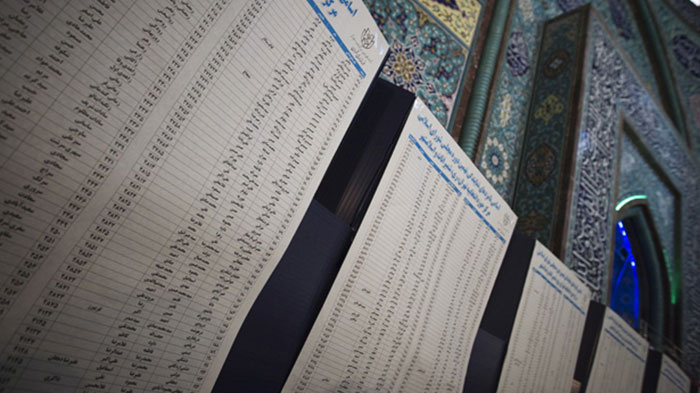Iran’s Bid to Counter Vote Buying May Victimize Rouhani

Members of Iran’s Guardian Council, a constitutional watchdog, are giving unanimous opinions about the possibility of vote buying in the country’s elections. So far, two of its top members have confirmed reports of what has been a political taboo for so many years.
Reform-oriented politicians including mastermind Saeed Hajjarian and former interior minister Ali-Akbar Mohtashamipour had warned of systematic subreption and distribution of Justice Shares to influence the ballots a few years ago but their warnings were little heard in the wake of the disputed 2009 presidential race.
When the dust settled, the row about vote buying came to fresh light at the heart of a blame-game correspondence between Ahmadinejad and his vice Mohammadreza Rahimi over the latter’s pack of financial corruptions. When Rahimi was convicted in a case of Iran Insurance Co. embezzlement, being handed a sentence for more than five years in prison, Ahmadinejad’s bureau issued a statement baling on him that shrugged any links to his tenure under the ninth and tenth administrations. He wrote an open letter in response, revealing how political parties indirectly interfere in parliamentary elections.
“Before any parliamentary election, political factions establish committees to plan and direct the elections … Some principlist figures formed a committee and a decision was made to financially support principlist candidates through nongovernmental aid. Among the fund donors, someone named Jaber Abdali was introduced to me through some MPs, judicial and executive officials … In sum, he donated 1.2 billion tomans … that has been paid to almost 170 Majlis candidates,” Rahimi wrote.
Despite Rahimi’s conviction and the judiciary’s pledge to investigate the so-called 170-man list, no names came out and the Guardian Council declined to comment. In February 2015, Judiciary spokesman Gholamhossein Mohseni Eje’i told a weekly presser that a majority of those included in the list were not MPs or even candidates, while a few of them were former MPs or candidates.
A year later however, Mohammad Bayatian, who represented Bijar in the ninth Majlis, revealed in an interview with Iran’s Labor News Agency (ILNA) that Rahimi had prepared a fresh 70-man list for the February-2016 parliamentary election from inside the prison. “Most hopefuls backed by Rahimi have run from western and northwestern provinces and they are mostly qualified,” ILNA quoted him as saying. They cruise with their headlights off, simply passing through the sieve of overseeing bodies, becoming qualified by the guardian council. While backed by huge financial support from Rahimi, they fuel disunity and division, Bayatian added.
Regardless of whether there was a link to Rahimi or not, these remarks proved to carry at least some degree of truth after the election was held. The Guardian Council annulled the election in the southern province of Hormozgan, over what is now known as the involvement of dirty money. And it was apparently so larger in scale than Rahimi could have single-handedly managed.
In fact, part of the dirty money has apparently come from abroad, according to GC Bureau Chief Ali-Akbar Vahidi. “Influential political and social figures of the region” have also resorted to threatening and luring. “Various reports had been submitted to Hormozgan’s supervisory panel regarding vote buying, distribution of food supplies, and initiation of dirty money into the election with firm documents that could not be overlooked,” Vahidi told Fars News Agency.
More instances have been revealed across the country including in northwest of the country. Mansour Haghighatpour, former MP, also says that only in Ardabil 18 groups have been jailed for bringing voters in cars and accompanying them to the ballot box. Each voter has reportedly received 50000 tomans (nearly $16) out in the open.
Interior Ministry had also been alarmed of the use of dirty money in elections, despite the fact that it does not seek public controversies. Iranian media outlets could not turn a blind eye when Interior Minister Rahmani Fazli withdrew his previous warning and declined to pay the names in an open parliamentary session. However, he made it clear that smugglers need supporters and find them among the powerful.
Even the secretary of the highest supervisory authority, Guardian Council, has endorsed these sporadic reports. Ayatollah Ahmad Jannati has spoken of vote buying issues in different stages of the recent parliamentary elections, including in the vetting process, executive measures and on the day of voting. “One of our problems is that vote buying is becoming prevalent and this will lead to a Majlis dominated by capitalists and wealthy people, and that means only those with more money could achieve entry into Majlis”.
Two weeks ago, Guardian Council spokesman Abbas-Ali Kadkhodaei told a news conference that law enforcement on such offences is minimal, temporal and slow, having little effect, ILNA reported. He favored prevention to post-offence action, saying the two solutions at hand include e-voting and voter registration.
Such corruptions have been one of the declared concerns of the Rouhani administration. Nearly two years ago, Vice President Eshagh Jahangiri had touched the issue when speaking of the money controlled by imprisoned tycoon Babak Zanjani. “We are not going to be fooled. Some friends are misguiding us to the wrong places after corruption,” he said. However, given the heat expected around next year’s presidential race, countermeasures by the Guardian Council and other supervisory bodies may tighten the principlist grip over the administration.

